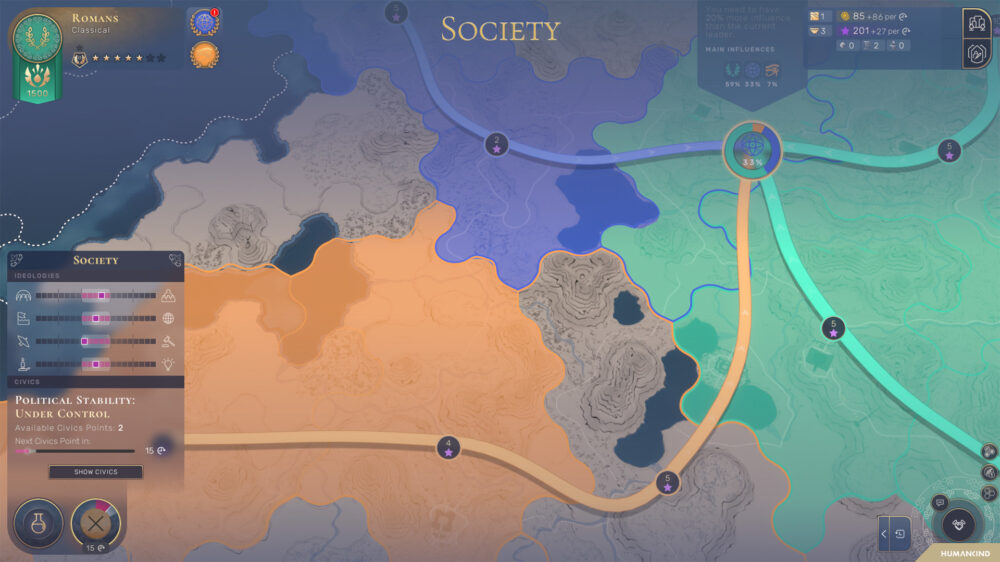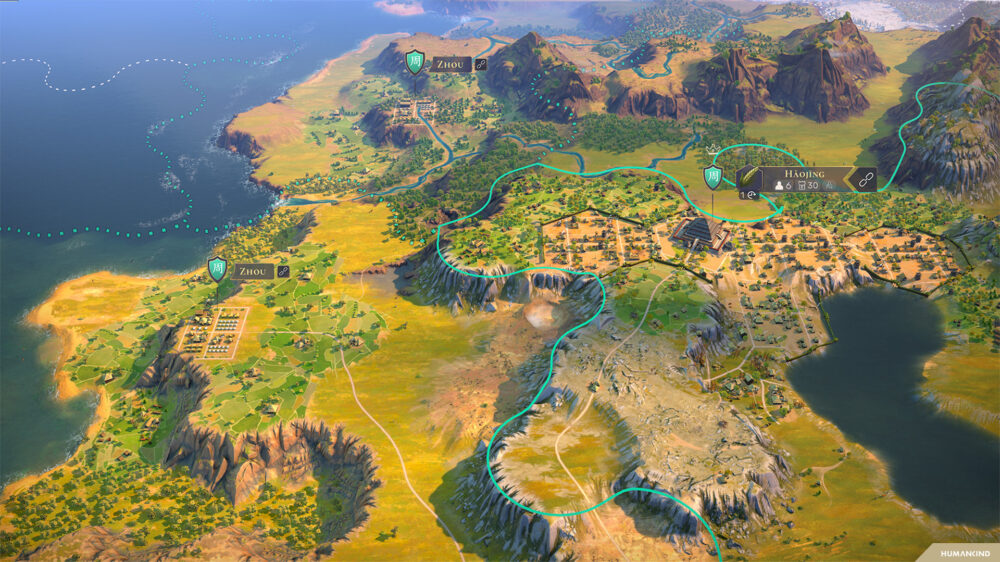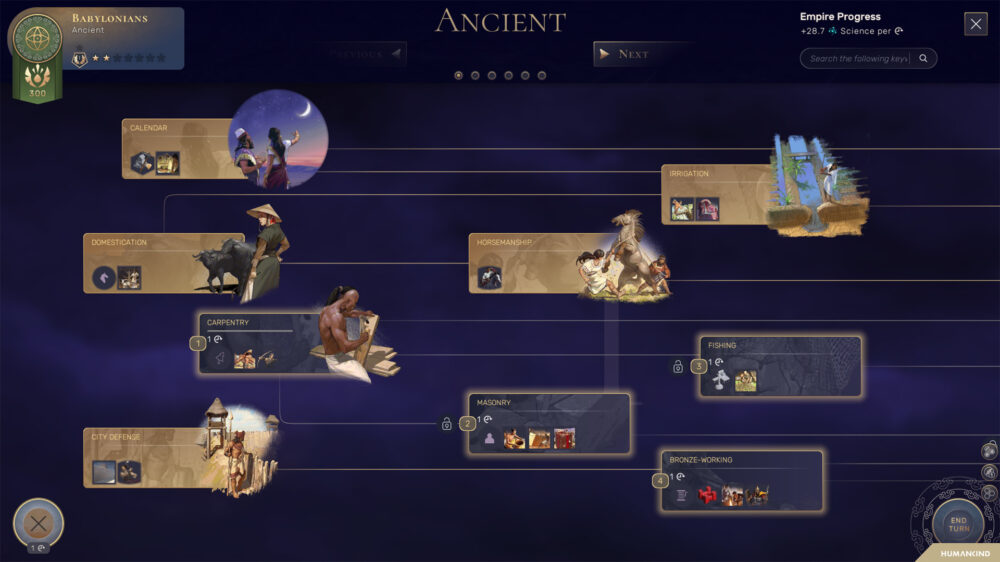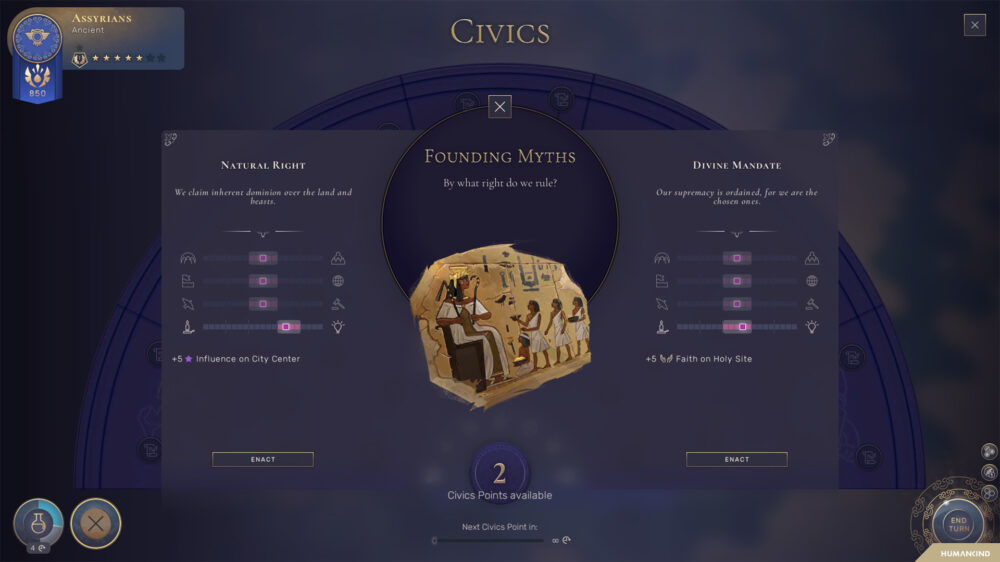For 4X strategy game fans, Humankind has been a beacon of hope for the future of its genre since 2019. Amplitude’s team of notable pedigree (Endless Legend, Endless Space) have designed the game in recognition of the best of its peers, but have sought to make the story of history a tale told by the player and about the player. Humankind places the importance of your choices above the merits and/or downfalls of any true historical leader gone by. Your influence on Humankind is at the very forefront of the game’s process. The decisions you make as you advance your civilisation through the ages are at the core of the tribulations and prosperities that your people will encounter. This is a story about your place in history…

” Humankind is a wholly recommendable title for 4X fans, and indeed strategy fans in general…”
Humankind starts as any traditional 4X strategy game does. You control a single, small tribe with little knowledge of the wider world, seeking to explore and settle as you hunt, forage and discover your way out of the Neolithic era. Upon educating your people sufficiently over the first ten-or-so turns of the game, you are then offered a choice of notable Ancient era civilisations to inherit the traits, unique buildings and unique units of for the first proper age of the game. Civs such as Egypt, Babylon, Persia and more are categorised into Expansionists, Scientists, Economists and Strategist states to help you decide your initial method for growth and glory. What makes Humankind stand out the most from its competitors is the fact that this is merely the first of 6 such choices that you will make as you play.

Humankind, unlike Civilization, does not ask you to lock into playing as a single Civ for the entirety of a game. Instead, you inherit the traits of a notable civilisation from each era of history you play through to create one of over a million possible combinations of hybrids. This allows you to build upon one strategy, to course-correct if necessary, or even to transcend these eras of history by maintaining an earlier Civ throughout the game. Each method is equally valid and useful depending on the unique situation you may find yourself in any given game. Advancement can see you through to the future with ever-improving units and buffs, whereas transcendence will give you a boost to your overall Fame in future eras. Whilst your civilisations’ development may be placed at a minor disadvantage with the latter option, it is Fame in Humankind that wins games.

Rather than a Civ-like flurry of methods towards victory, Humankind culminates these options into a score-based model called Fame. Fame is earned through a variety of actions in the game from the Ancient era onwards, allowing players to utilise any preferred or relevant strategy in an attempt to establish their position. Building wonders, discovering technologies, winning wars and acquiring the era stars needed to advance through the ages of Humankind all add to your Fame tally, as well as being the first to perform such feats. The game only ends when the turn limit is reached or one of a variety of key actions takes place. When this conclusion point comes about, whomsoever has accumulated the most Fame is the victor; no matter their methods of approach. On the one hand, Fame simplifies the victory process in Humankind. It is easy to track positions in an instant through the UI and see exactly who is leading. On the other hand, specialist players who are used to the multiple victory routes offered in a game like Civilization may find that Fame is limiting and stifling to their options. Admittedly, I started in the latter camp but did come around to Fame the more time I spent playing the game.

As briefly noted above, a lot of your expected 4X strategy elements are also present in Humankind. A familiar-feeling tech tree, civic tree and resource pot make up some of the basics, with map essentials such as tile yields and luxury and strategic resources all being a part of the mix. All of these aspects are executed in what could fairly be considered a “standard” way for this type of game, but some aspects of play are notably different, notwithstanding superior, in Humankind than some of its competitors. The most clear and present of these is combat, which I will approach directly in a moment. In addition, the real standout of Humankind for me as a Geography teacher was the map. Whilst this, too, is a standard hex layout as you might expect from this type of game, the physical landscape beneath the grid is more realistic and enticing than any such game I have played before. The world does not look like a jigsaw puzzle, instead bearing huge, rolling hillscapes, believably dominant landscapes and realistic biomes which tend to follow the basic rules of where they might be seen relative to their locations on the Earth. The appearance of the game does wonders to bolster its wider appeal, and will likely be a huge draw for strategy fans reviewing screenshots when deciding whether to go in.

Many 4X strategy games use simple dice rolls to determine the outcome of combat situations. Units have +/- factors depending on their age and specific pros and cons, and generally, you need only match your units to their opponents effectively to win a battle. Humankind steps up the game in the combat arena, creating something of a hybrid between this and a Total War or Xcom-style setup. When a combat situation is engaged, units can be placed by the player in a formation of their choosing on the map. To win the battle, the player must either defeat all enemy units or capture the enemy flag on the field of play. Maintaining a turn-based model, players then engage in a fairly traditional skirmish until a victor is found. Although it is still a fairly simple combat system, the ability to have some input in each battle allows a proper determination of strategy rather than relying almost purely on spreadsheets. It is a minor alteration to how 4X combat plays out which has a pretty major influence on the game. Human intervention in how a battle should be played mans you can fight against the odds and still, at times, achieve victory. Similarly, siege’s on cities can be maintained to build powerful siege weapons or, on the flip side, bolster defenses ahead of a fight. If things are going awry, reinforcements can travel to the field of battle to further assist the war effort too. Truly, going back to dice roll mechanics after experiencing Humankind’s approach would be a sincere downgrade.

As eluded to at the start of this review, and worthy of note as I bring this review to a close, the choice is a huge USP for Humankind. It makes the process of the play stand out substantially from alternative 4X games and provides an element of risk and reward to the proceedings. Key choices are placed before you as a great leader throughout the ages. Sometimes this can be deciding whether or not to allow foreign refugees to enter your city. At other times, you may have to choose to revoke your people’s civics to create a greater synergy with your neighbouring nations. Every decision has consequences, whether it is swaying your people’s ideology, increasing or decreasing a city’s stability, or giving you a boon to research, income or growth for a period of time. These choices, alongside your wider strategy, make the game consistently interesting and changeable and help Humankind’s storytelling element to remain at the forefront over the hours which make up a game.

These elements and more make Humankind a wholly recommendable title for 4X fans, and indeed strategy fans in general who would like to experience a broader and polished new entry in the genre. There is so much more to say, for players to discover, in Humankind. Truly, without writing a tome as long as the game itself it is difficult to cover everything. I have opted to cover the basics and portray my enthusiasm, as a player with thousands of hours spent playing Civ, Age of Empires and like-games through my lifetime, for what the Humankind team have produced. In lieu of Civ VII, Humankind will see me through for the foreseeable future. Oh, and how satisfied I shall be…
Grab Humankind on Steam for £39.99 here.
Enjoy the review? want to read more of our reviews? then click right here to be whisked away to the realm of our opinions.








You must be logged in to post a comment.